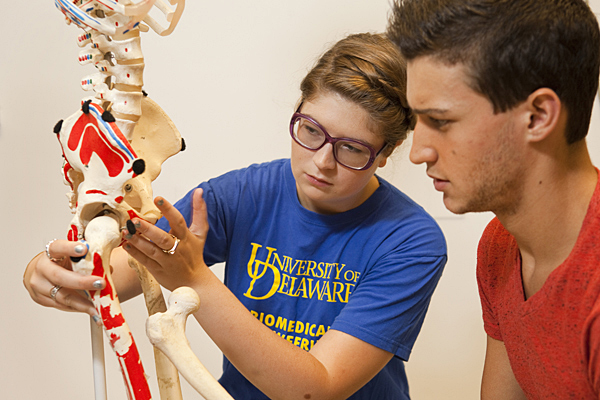Wildly popular major
Biomedical engineering enrollment maxed out in second year
1:52 p.m., Sept. 19, 2011--Until last year, Nick Campagnola wanted to pursue a career in cancer research or oncology. But when he learned about the new biomedical engineering degree program at the University of Delaware, he quickly changed his mind.
“Biomedical engineering allows me all the opportunities of a traditional science degree while simultaneously opening up career options in engineering disciplines,” says the junior. “Now, I stand out to graduate programs, medical schools and potential employers because of my major.”
Campus Stories
From graduates, faculty
Doctoral hooding
Biomedical engineering is an emerging field that applies fundamental engineering principles to the study of biology, medicine, behavior and health. U.S. Department of Labor statistics cites the career specialty as the fastest-growing occupation, with jobs in the field expected to grow by 72 percent by 2018.
Campagnola is among a growing number of UD undergraduate students clamoring to declare biomedical engineering as a major, in hopes of becoming the next generation of leaders and innovators bridging the gaps between medicine, engineering and biomedical research.
Student enrollment in the UD program, which was launched fall 2010 with 18 declared students, grew by 194 percent in its first semester and by 511 percent over one year. Today the program boasts 110 incoming freshmen and sophomores and a wait list for entry into the newly restricted major. One-third of these students are female, with another third enrolled in the Honors Program. Forty percent of the students are Delaware residents.
“The program’s early success demonstrates how needed the major was and its tremendous growth potential,” said program director Dawn Elliott, who joined UD Sept. 1. Elliot succeeded Jill Higginson, associate professor in mechanical engineering, who helped develop and launch the undergraduate program and who continues as its associate director.
The biomedical engineering program may also have a positive economic impact for the state, according to recent comments from President Patrick T. Harker.
“High-wage, high-skill jobs simply won’t come to Delaware without the infrastructure to support them and without workers trained for them. Critical industry partnerships will not happen without our equal investment—investment in capital projects like the Science and Technology Campus and the Interdisciplinary Science and Engineering Lab, and in programs that fill emerging marketplace needs, like our undergraduate biomedical engineering program, whose enrollment has maxed out in only its second year. These investments don’t diminish our land-grant commitment; they reinforce it,” Harker said.
The four-year curriculum is dense with basic science and engineering courses, including topics such as biomaterials, signals and systems, biomechanics and biochemistry. This cross-disciplinary training enables students to become, in a way, multilingual – fluent in biology, as well as math and engineering – skill sets that can be practically applied in many fields.
“The way biomedical engineering applies engineering principles to help health is critical across a wide spectrum, particularly with the aging population – for orthopedic issues, musculoskeletal issues, but also Alzheimer’s disease and the electrical circuitry related to understanding how the brain works,” added Elliott.
A biomechanical engineer by training, Elliott spent 12 years in the University of Pennsylvania’s Department of Orthopaedic Surgery. Internationally known, her research focused on lower back pain and osteoarthritis, studying how and why the intervertebral spine breaks down with aging and developing and testing therapeutics used in treatment. She will continue this research at UD through ongoing collaborations with her UPenn peers and new partnerships with her UD colleagues.
“Dawn’s strong research program in orthopedic biomechanics and her interest in disc degeneration and material properties of spine components complements research already occurring on our campus,” said Babatunde A. Ogunnaike, interim dean of the College of Engineering. “Her sterling intellectual reputation, academic vision and boundless energy make Dawn that rare architect-and-builder needed to help the college elevate this important program to national recognition, while meeting growing student and industry demands.”
The first order of business, said Elliott, is to establish a biomedical engineering doctoral program, followed by a master’s degree program that will both attract talented faculty and provide needed research infrastructure.
“Biomedical engineering has the potential to impact human health, but at a more fundamental level, there is also opportunity to increase global understanding of the science of human health,” remarked Elliott. “My role is to foster connections across all disciplines and integrate the biomedical engineering research already occurring on campus under one program.”
"I envision our faculty bringing engineering directly to bear on the medical arena through translational, patient-oriented research that touches the patients who come through the Science and Technology Campus. Additionally, I foresee fundamental research continuing on the main campus, enabling students to gain both the academic skills and research experiences they need to pursue the careers they want.”
About Dawn Elliott
Elliott was a professor in orthopedic surgery and in bioengineering at University of Pennsylvania from 1999-2011. She was founding director of the structure-function biomechanics core center in the Penn Center for Musculoskeletal Disorders. Her research expertise includes the biomechanics of collagenous soft tissues and intervertebral disc function, degeneration and restoration.
Elliott received her bachelor’s degree in mechanical engineering from the University of Michigan. She earned her master’s in engineering mechanics at the University of Cincinnati and her doctoral degree in biomedical engineering at Duke University.
She has held leadership roles in the Orthopaedic Research Society and the Bioengineering Division of the American Society of Mechanical Engineering. A member of AO Spine and International Society for the Study of Lumbar Spine (ISSLS), Elliott serves as a reviewer for numerous journals in the area of Orthopaedics and Biomechanics and is a frequent grant reviewer for the National Institutes of Health.
Article by Karen B. Roberts
Photos by Ambre Alexander












